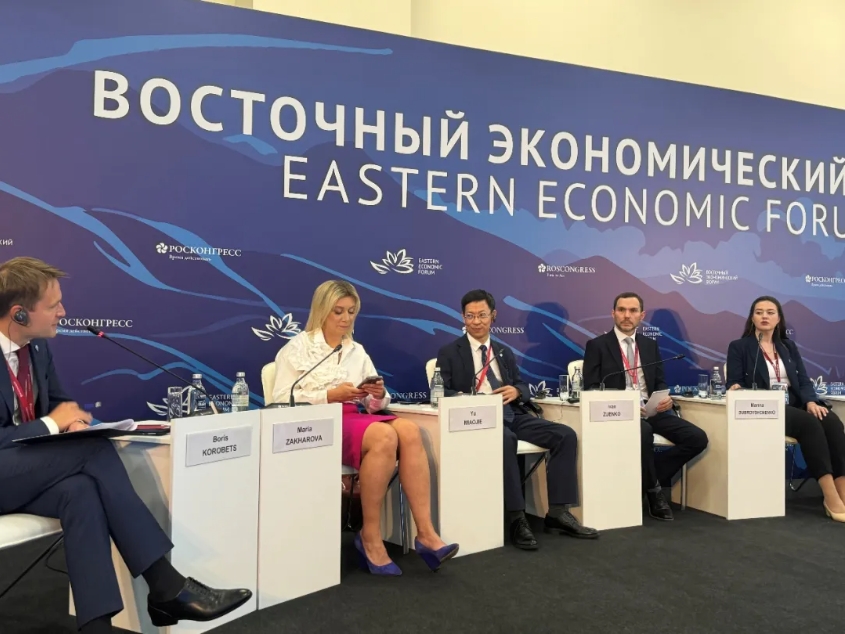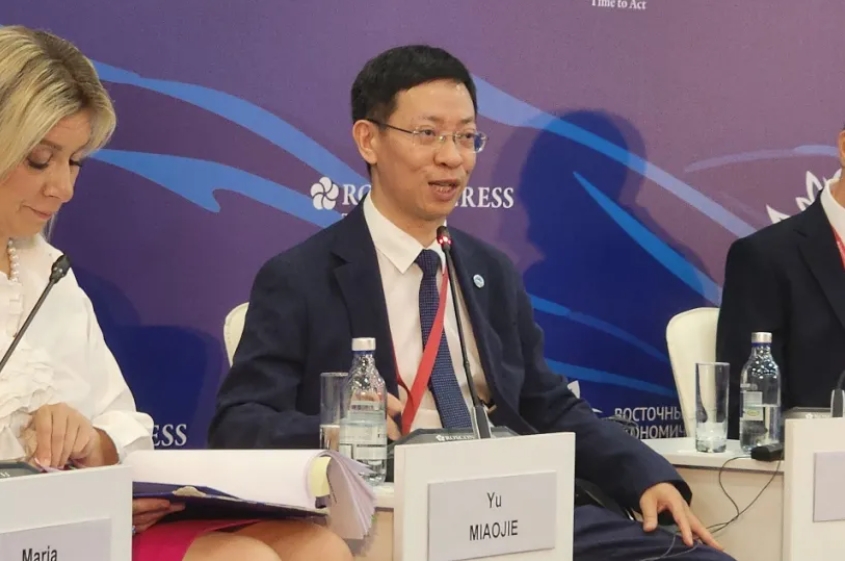From September 3 to 6, 2024, the 9th Eastern Economic Forum was held in Vladivostok, Russia. The forum, themed ‘Far East 2030: Combining Strengths to Create New Potential’, brought together over 6,000 officials, entrepreneurs, scholars, and experts from 76 countries and regions. The agenda included discussions on international cooperation in a changing world, issues related to the global economy and financial situation, and the development of Russia’s Far East and its role in the region.
Professor Yu Miaojie, a Deputy to the 14th National People’s Congress, fellow of the International Economics Association, Deputy Secretary of the CPC Committee and President of Liaoning University (LNU) was invited to attend the 9th Eastern Economic Forum and visited the Russian Far Eastern Federal University during the time. Associate Professor Yin Ruyu, Deputy Director of the Office of International Affairs, Professor Yin Hong from School of International Economics and International Relations and Assistant Professor Chen Feng from Li Anmin Institute of Economic Research also joined the visit and conducted academic exchanges.
On September 4, 2024, Yu Miaojie was invited to attend the sub-forum of the Eastern Economic Forum titled ‘FEFU: 125 Years of Training Specialists to Develop Russian-Asian Relations’, and delivered an important speech. The forum was chaired by Boris Korobets, Rector of Far Eastern Federal University. The speakers included Alexey Chekunkov, Minister of the Russian Federation for the Development of the Far East and the Arctic (who spoke online), Maria Zakharova, Director of Department of Information and the Press, Ministry of Foreign Affairs of the Russian Federation, Ivan Zuenko, Associate Professor of the Department of Oriental Studies, Senior Researcher at the Institute of International Studies, MGIMO University, and Marina Dubrovshchenko, gold medalist of the ‘I’m a Professional’ Olympiad.

Yu Miaojie began by extending his warm congratulations to Far Eastern Federal University on its 125th anniversary. He highly praised the significant contributions the university has made to Russia’s economic and social development over the past 125 years, particularly highlighting its crucial role in promoting cultural education and social progress in the Far East region. He then shared five reflections on the value and mission of universities. Firstly, he mentioned the recognition by students. When considering the mission of a university, his first thought is the recognition from students or, more specifically, whether parents are willing to send their children to this university, which is an important measure of a university's value. Yu Miaojie took LNU as an example, explaining that as a comprehensive university, LNU encompasses a wide range of disciplines including literature, history, philosophy, economics, management, law, science, engineering, medicine, and art. It is a key institution in the ‘Project 211’ and a university of national ‘Double First-Class’ initiative. In terms of student admissions, LNU maintains strong appeal. Although the enrollment scale has increased this year, the admission scores for the college entrance examination have risen compared to last year, reflecting the university’s continually improving reputation and broad social recognition.
Secondly, he talked about the contribution of faculty members. The faculty at LNU play a crucial role in the international academic field. LNU’s teachers are frequently invited to participate in significant global projects, such as writing the WTO annual reports, attending meetings of the Royal Economic Society in the UK, and engaging in academic activities with the National Bureau of Economic Research (NBER) in the US. LNU has achieved remarkable success in international cooperation, establishing close partnerships with many leading universities abroad, which has significantly enhanced its global academic standing. The university regularly hosts international conferences, and its collaboration with numerous academic institutions around the world continues to expand and deepen. In particular, the cooperation with Far Eastern Federal University has become a focal point for both institutions. Yu Miaojie emphasized that through participation in economic and social development projects in the Far East, LNU’s international cooperation has been further strengthened. He is confident that as these collaborative projects develop further, the academic contributions of LNU’s teachers will be significantly enhanced, and the university’s influence in the global academic community will continue to grow.
Thirdly, he discussed policy consultation. LNU provides extensive policy consulting advice to both central and local governments, particularly in the areas of economic and social development. Yu Miaojie emphasized, “Our research results are highly valued in national and provincial policy-making, reflecting the impact of academic research on real-world issues”. This highlights the importance of the university’s social responsibility and research capabilities in policy formulation.
Fourthly, he addressed social responsibility, especially how universities respond to and address social issues. LNU publishes various academic journals, including the international journal Digital Economy and Sustainable Development, published in collaboration with Springer. Yu Miaojie also specifically mentioned the Asian Economic Papers, published in collaboration with MIT, and the upcoming China Development Quarterly, which will be launched in partnership with Springer. These journals provide important platforms for global scholars to explore social issues and economic development.
Fifthly, he highlighted international cooperation. LNU has established partnerships with over 160 universities worldwide and offers joint master’s and undergraduate programs, particularly the MBA program in collaboration with Far Eastern Federal University. These programs offer students rich learning and practical opportunities, giving them a competitive edge in the global job market. Yu Miaojie noted, “Such international exchanges not only contribute to students’ academic development but also promote cultural exchange and cooperation between countries”.

Finally, in his summary, Yu Miaojie stated that LNU will continue to deepen its collaboration with Far Eastern Federal University, further advancing joint training programs, cross-border academic exchanges, and research cooperation. This will lay a solid foundation for cooperation between China and Russia in higher education, talent cultivation, and scientific research. He emphasized that education is a key driving force for long-term cooperation between China and Russia, and LNU will continue to contribute to the development of bilateral relations.
Watch the full speech here.